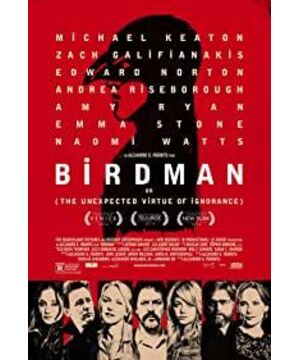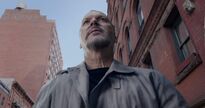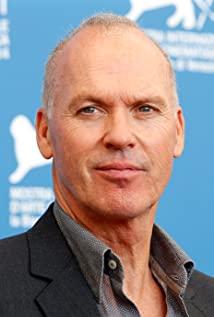Later, after watching the Birdman trailer, I realized that I was making a movie at that time.
Fortunately, it is a movie. Otherwise, make judgments on the limited content on the screen, and objectively think about its basic settings: veteran superheroes, plot settings that are scratchy, the preview period is enough for the industry to ridicule, and the industry's collective bad reviews are inevitable. From my perspective, it is really difficult to see the appeal of this drama.
The "cause" described in the movie is of great practical significance in today's Broadway. Broadway, or as I call it more lazily: Broadway (literally translated Broadway), there are three trends:
first, film and television people flock to the theater to make cold rice;
second, well-known film novels are adapted into dramas;
third, from theaters on the other side of the ocean Select high-quality dramas for re-production in Broad Street.
What appears in the movie is the first situation.
Just this year, the movie stars who came to Broadway to make money include Hugh Jackman (drama The River), Bradley Cooper (drama Elephant Man) and so on. Big-name movie stars have long become regulars on Broad Street every year, and it was the same in previous years.
However, most of the movie stars come to Broad Street for acting, not like the heroes in the movie, because their careers encounter Waterloo and try to make a comeback on Broad Street. Not only that, a large number of powerful visual stars and movie stars have created many dramatic records here and made indelible contributions. For example, in 2013, Tom Hanks' drama "Lucky Guy" was very popular. In 2014, Bryan Cranston's drama "All the Way" won the Tony Award for Best Actor, and Scarlett Johansson's 2010 drama A View from the Bridge won her that year. Tony Awarded for Best Supporting Actress in a Drama, that was her first time on the Broad Street stage.
A normal celebrity drama should look like this:
a large amount of publicity and hype a year in advance; the celebrity does not enter the theater for rehearsal until one or two months before the preview; reliable or unreliable theater performances; no worries about box office revenue; A lot of PR and publicity; appearing in the eyes of the audience forever with determination and kindness; time-limited residency period; the back door of the theater that is always full of fans and onlookers who don’t know the truth...
The St. James Theater in the movie, Located between 44th Street, Eighth Avenue and Broadway in the New York Theater District. The main entrance of the theater faces the Majestic Theater and "The Phantom of the Theater" is staged throughout the year. "The Phantom of the Theater", like the Lion King, Chicago, Mamma Mia (next-door neighbor of the Phantom of the Theater), and Les Misérables, is one of the most popular classic musicals on Broadway by tourists.
One characteristic of these musicals, known as "tourist dramas," is that for more than forty minutes to an hour before the theater opens, tourists will spontaneously line up to an incredible (and unnecessary) line to enter the venue, sometimes chaotically. Across the road, there will be heavy traffic jams across 44th Street. Therefore, there are a lot of scenes in the movie where there is no one at the door of "The Phantom of the Opera" before and after the opening, which is not a small bug.
If the male protagonist in the movie is as famous as the setting, he walks back and forth in front of the theater without a bodyguard to follow? Haven't been surrounded by onlookers to sign?
This can only be explained by deleting irrelevant factors in order to smooth the plot.
Then there is the connection with the old lady of the critic.
A good drama review is indeed an important factor in the stability of the box office of a new Broadway drama, but you have to say that a drama starring a big-name superhero movie star and a cutting-edge topical male star will instantly go bankrupt due to a bad review. That’s right. There is no clear understanding of the audience structure of the new drama, and the purchasing power of the audience of star dramas is also underestimated.
The furious 15-year-old loli do not understand drama reviews, loyal fans of celebrities do not care about drama reviews, and tourists who come to New York to relax on vacation do not know drama reviews. But these people account for 70% of theater revenue.
In the movie, the actor would be so mindful of an article published by an old lady of NYT drama critics that he would not hesitate to threaten swear words in the bar, making it impossible to understand the necessity of such behavior.
What's more, theatrical artist is an ancient profession in the entertainment industry that has the same life as the two words "hypocrisy and hypocrisy". What everyone is best at is acting. The "truth" that is too much emphasized and embodied in this movie is mostly a tacit falsehood if it is put in the real world of drama.
The final climax in the movie, the performance in which the actor broke his nose with a gun, was opening night, that is, during the preview (preliminary period, usually a month-long ticket rehearsal), the drama was tailored to the audience’s reaction. Content), an exclusive night for the media, friends, and industry insiders. The "formal performance period" is entered after open.
However, what is inconsistent with reality is that there are fewer and fewer critics to watch the opening night nowadays. Some critics have finished writing during the preview period, and many have even published reviews during the preview period. Like in the movie, NYT's critics sat in the second row of the premiere night and quietly left before the curtain call of the theater. They probably only exist in the world of literary films.
In addition, the income of drama stars is related to box office dividends. Norton’s character devoted time to acting in drama, no matter how discordant he didn’t quit, but he couldn’t control his temper to make a bad PR. Unless the celebrity really has an antagonism with money, awards, and drama, and has a suicidal tendency than the male protagonist, it is another time that the explanation is too magnified.
Comparison, feedback and introduction of the real situation of Broadway are the main content of this film review. But I don't think these discrepancies with the reality can be called reasons to criticize it.
Because-Birdman is a movie after all, not a documentary.
I sincerely love it to take the audience backstage on a day trip to the St. James Theater. Based on this, I would recommend this movie to everyone.
Even though many times of artistic magnification and superposition made the ending inevitably rush towards the vulgar direction, I had no choice but to guess the ending half an hour before the end of the film, but I believe that this is just a small ailment that the literary film itself cannot cure. .
The art that floats on the edge of reality and illusion, with such a degree of control, is already quite commendable.
View more about Birdman or (The Unexpected Virtue of Ignorance) reviews










